Transcellular transport - Study guides, Class notes & Summaries
Looking for the best study guides, study notes and summaries about Transcellular transport? On this page you'll find 276 study documents about Transcellular transport.
Page 3 out of 276 results
Sort by
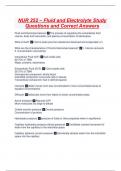
-
NUR 252 – Fluid and Electrolyte Study Questions and Correct Answers
- Exam (elaborations) • 13 pages • 2024
-
Available in package deal
-
- $9.99
- + learn more
Fluid and Electrolyte balance The process of regulating the extracellular fluid volume, body fluid osmolality, and plasma concentration of electrolytes What is fluid? Fluid is water plus the substances dissolved and suspended in it What are the characteristics of Fluid & Electrolyte balance? 1. Volume (amount) 2. Concentration (osmolarity) Intracellular Fluid (ICF) fluid inside cells 63-70% of TBW Water, proteins, electrolytes Extracellular Fluid (ECF) Fluid outside cells 30-37% of TBW Intra...
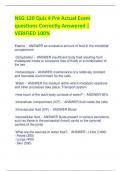
-
NSG 120 Quiz 4 Pre Actual Exam questions Correctly Answered | VERIFIED 100%
- Exam (elaborations) • 19 pages • 2023
-
Available in package deal
-
- $10.99
- + learn more
NSG 120 Quiz 4 Pre Actual Exam questions Correctly Answered | VERIFIED 100% Edema - ANSWER an excessive amount of fluid in the interstitial compartment Dehydration - ANSWER insufficient body fluid resulting from inadequate intake or excessive loss of fluids or a combination of the two Homeostasis - ANSWER maintenance of a relatively constant and favorable environment for the cells Water - ANSWER the medium within which metabolic reactions and other processes take place. Transpo...
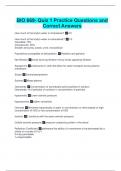
-
BIO 669- Quiz 1 Practice Questions and Correct Answers
- Exam (elaborations) • 12 pages • 2024
-
Available in package deal
-
- $9.99
- + learn more
How much of the body's water is intracellular? 2/3 How much of the body's water is extracellular? 1/3 Interstitial: 75% Intravascular: 25% Smaller amountsL sweat, urine, transcellular Populations susceptible to dehydration: Pediatric and geriatric Net filtration forces favoring filtration minus forces opposing filtration Aquaporins small pores in cells that allow for water transport across plasma membrane Solute Electrolytes/proteins Solvent Water/plasms Osmolarity Concentration of osmo...
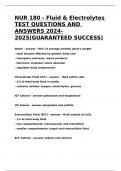
-
NUR 180 - Fluid & Electrolytes TEST QUESTIONS AND ANSWERS 2024-2025(GUARANTEED SUCCESS).
- Exam (elaborations) • 9 pages • 2024
-
- $14.99
- + learn more
Water ~60% of average healthy adult's weight - total amount affected by gender, body size - transports nutrients, waste products - lubricant, insulator, shock absorber - regulates body temperature Intracellular Fluid (ICF) - fluid within cells - 2/3 of total body fluid in adults - contains solutes: oxygen, electrolytes, glucose Previous Play Next Rewind 10 seconds Move forward 10 seconds Unmute -- / -- Full screen Brainpower Read More ICF Cations potassium a...
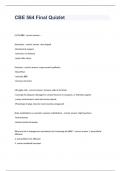
-
CBE 564 Final Quizlet 2023/2024 verified to pass
- Exam (elaborations) • 14 pages • 2023
- Available in package deal
-
- $17.99
- + learn more
CBE 564 Final Quizlet [3/23] BBB - correct answer -- Astrocytes - correct answer -star-shaped -biochemical support -nutrients, ion balance -repair after injury Pericytes - correct answer -wrap around capillaries -blood flow -maintain BBB -immune cell entry Microglia cells - correct answer -immune cells in the brain -scavenge for plaques; damaged or unused neurons or synapses, or infectious agents -survey environment, send and receive signals -Phenotype change, become more reac...
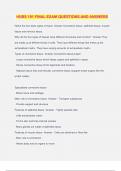
-
HUBS 191 FINAL EXAM QUESTIONS AND ANSWERS
- Exam (elaborations) • 119 pages • 2024
- Available in package deal
-
- $15.49
- + learn more
HUBS 191 FINAL EXAM QUESTIONS AND ANSWERS Name the four basic types of tissue -Answer-Connective tissue, epithelial tissue, muscle tissue and nervous tissue. Why do the four types of tissues have different structures and function? -Answer-They are made up of different kinds of cells. They have different things that make up the extracellular matrix. They have varying amounts of extracellular matrix. Types of connective tissue -Answer-Connective tissue proper - Loose connective tissue which...
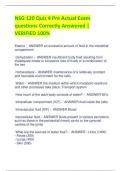
-
NSG 120 Quiz 4 Pre Actual Exam questions Correctly Answered | VERIFIED 100%
- Exam (elaborations) • 19 pages • 2024
- Available in package deal
-
- $15.99
- + learn more
NSG 120 Quiz 4 Pre Actual Exam questions Correctly Answered | VERIFIED 100% Edema - ANSWER an excessive amount of fluid in the interstitial compartment Dehydration - ANSWER insufficient body fluid resulting from inadequate intake or excessive loss of fluids or a combination of the two Homeostasis - ANSWER maintenance of a relatively constant and favorable environment for the cells Water - ANSWER the medium within which metabolic reactions and other processes take place. Transpo...
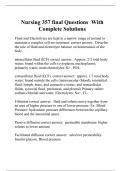
-
Nursing 357 final Questions With Complete Solutions
- Exam (elaborations) • 11 pages • 2023
-
- $10.49
- + learn more
Fluid and Electrolytes are kept in a narrow range of normal to maintain a complex cell environment. correct answer: Describe the role of fluid and electrolyte balance on homeostasis of the body. intracellular fluid (ICF) correct answer: Approx. 2/3 total body water; found within the cells (cytoplasm, nucleoplasm); primarily water; main electrolytes: K+, PO4- extracellular fluid (ECF). correct answer: approx. 1/3 total body water; found outside the cells (intravascular (blood), interstit...
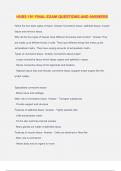
-
HUBS 191 FINAL EXAM QUESTIONS AND ANSWERS
- Exam (elaborations) • 119 pages • 2024
-
- $14.49
- + learn more
HUBS 191 FINAL EXAM QUESTIONS AND ANSWERS Name the four basic types of tissue -Answer-Connective tissue, epithelial tissue, muscle tissue and nervous tissue. Why do the four types of tissues have different structures and function? -Answer-They are made up of different kinds of cells. They have different things that make up the extracellular matrix. They have varying amounts of extracellular matrix. Types of connective tissue -Answer-Connective tissue proper - Loose connective tissue which...
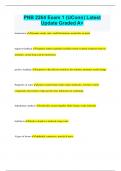
-
PNB 2264 Exam 1 (UConn) Latest Update Graded A+
- Exam (elaborations) • 12 pages • 2024
- Available in package deal
-
- $9.99
- + learn more
PNB 2264 Exam 1 (UConn) Latest Update Graded A+ homeostasis dynamic steady state; small fluctuations around the set point negative feedback response returns regulated variable toward set point (response removes stimulus), closed loop used for homestasis positive feedback response to the effector reinforces the stimulus; promotes useful change Properties of water polar-covalent bond creates sticky molecules, solvent to ionize compounds (electrolytes), high specific heat, lubrication & cushioni...

Did you know that on average a seller on Stuvia earns $82 per month selling study resources? Hmm, hint, hint. Discover all about earning on Stuvia


